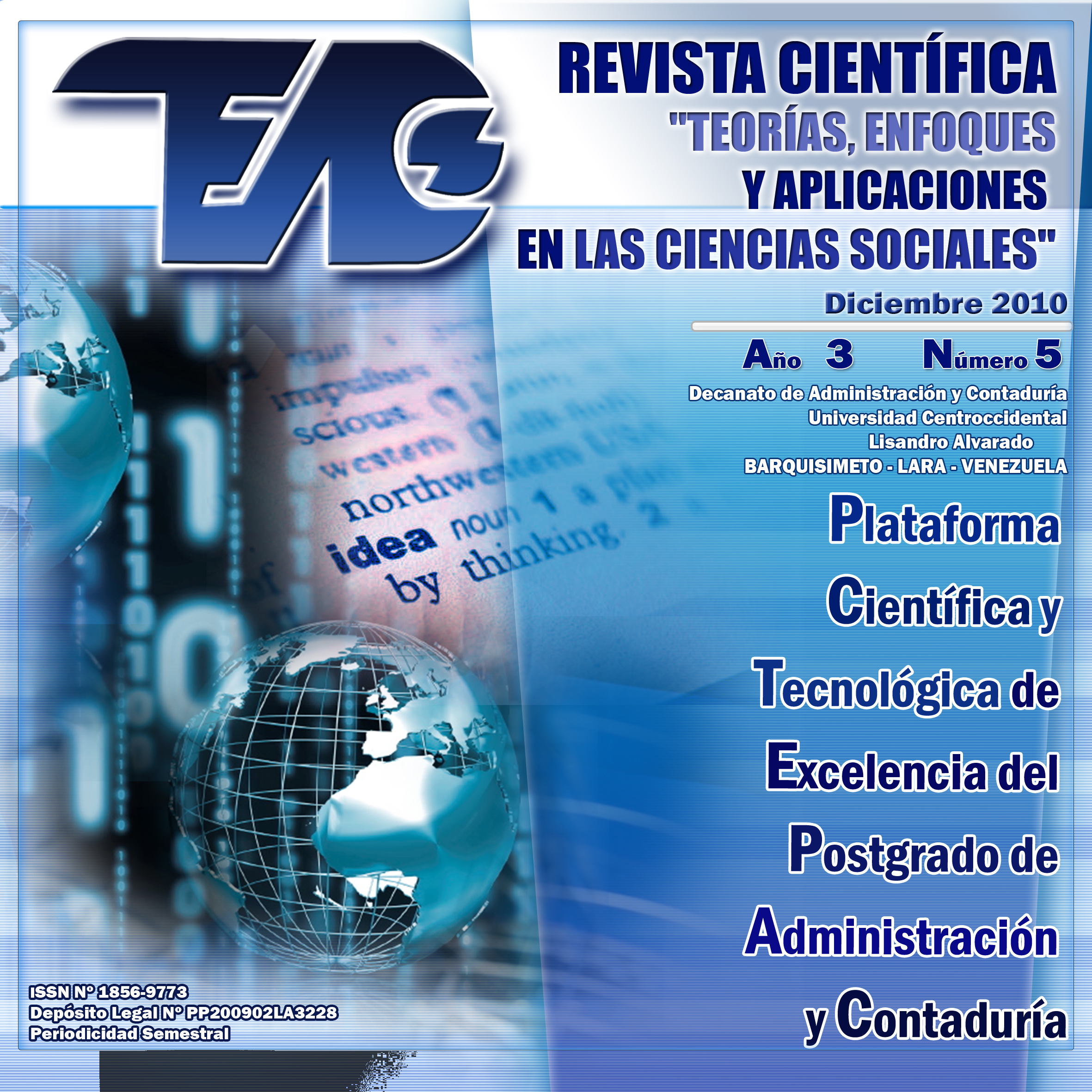Organizations based in inteligencia: approximation to an entrepreneurial reality of the century XXI
Keywords:
organization, intelligent organization, flexibility, human factor, competitionAbstract
The intelligent organization is synonymous of a company that the mandate to develop the knowledge and the competitions of the people with loud value, that it is characterized for a net in continuous expansion of his human capital improving of continuous form the handling of abilities, has attitudes, knowledge and understanding of the surroundings; Through cultivation and expansion of the employers of thoughts where the collective aspiration is to learn how to work as a team to create the results that are desired in terms of quality, with the social linkage's progressive identification, that is, reinforces the links that join them. You are for it, than the present essay XXI. attempts to examine the organizations based in intelligence, like an approximation to an entrepreneurial reality of the century the hermeneutics for the analysis of the theoretic contentses utilized a descriptive methodology and documentary, postulate itself For which. Stroke of ball mentioning than the study, it allowed coming to an end than the management of the century XXI, today more than ever she must pay attention to the role that you must perform in behalf of the company's human factor, looking for the way to achieve a cohesion of group, knowledge to utilize all of the tools that the executive coaching provides him. Knowing how to utilize besides, of efficient form, all of the legacy of knowledge that must be put in the center in the man's present-day behavior in the organizations manifesting his importance that way and implications in the organizational and space related to management, I eat also in the change processes planned within the companies with capability of learning.
Downloads
References
Butteriss M (2000). Reinventando Recursos Humanos: Cambiando los roles para crear una organización de alto rendimiento. Editorial EDIPE.
Chase, Richard; Jacobs, Robert y Aquilano, Nicholas (2004). Administración de Producción y Operaciones -Manufactura y Servicios, Mc Graw Hill, Décima edición, Bogota.
Chiavenato, Idalberto (2003). Administración de Recursos Humanos. Editorial McGraw-Hill. Bogota
Drucker, Peter (1985). La innovación y el empresariado innovador. Editorial Sudamericana. Buenos Aires. Argentina.
Majaro, Simón (2006). Como generar ideas para generar beneficios. Editorial Granica. Buenos Aires.
Martín, Fernando. (2004). Los Horizontes de la Creatividad. Editorial McGraw - Hill. México.
Martín, Javier. (2004). Nuevos Paradigmas. Editorial Gedisa. Barcelona.
Mora Vanegas Carlos (2002). El rol del factor humano en la empresa. Página web en línea. Fuente:http://www.degerencia.com/articulo/(consultado el 22-11-2010).
Morrisey, George L (2006). Pensamiento Estratégico, Editorial Prentice Hall. México. Hispanoaméricana. S.A
Senge, Peter (2005). La quinta disciplina: Como impulsar el aprendizaje en la organización inteligente. 2 edición. Barcelona, España: Granica.
Torres, Lenin y Guerra, Dulce (2008). La complejidad como paradigma innovador de la gestión del conocimiento en las organizaciones actuales. Memorias del XII Congreso Internacional de Investigación en Ciencias Administrativas. La academia de Ciencias Administrativas, A.C, y CETYS Universidad de Baja California México.> · "Empresas inteligentes: moda o necesidad" en Contribuciones a la Economía (2008). Página web en línea. Fuente:http://www.eumed.net/ce/2008ª (consultado el 15-11-2010).
Published
How to Cite
Issue
Section
Derechos del/de autor/es a partir del año de publicación
Esta obra está bajo la licencia:
Creative Commons Reconocimiento-NoComercial-CompartirIgual 4.0 Internacional (CC BY-NC-SA 4.0)
Las opiniones expresadas por los autores no necesariamente reflejan la postura del editor de la publicación ni de la UCLA. Se autoriza la reproducción total o parcial de los textos aquí publicados, siempre y cuando se cite la fuente completa y la dirección electrónica de esta revista. Los autores(as) tienen el derecho de utilizar sus artículos para cualquier propósito siempre y cuando se realice sin fines de lucro. Los autores(as) pueden publicar en internet o cualquier otro medio la versión final aprobada de su trabajo, luego que esta ha sido publicada en esta revista.



